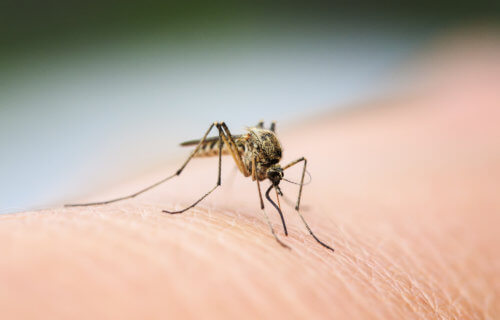KEELE, England — Have mosquitoes figured out how to beat the deet? According to new research, the pesky insects learn to dodge pesticides. They recognize the smell after single exposure and steer clear, making them ineffective, say scientists.
The study by scientists at Keele University in England and the University of Science, Malaysia shows the insects are more intelligent than previously thought.
“Understanding learning and memory is important for insects that transmit human diseases, because behavior such as host finding and blood-feeding have critical implications for their vectorial capacity and thus, disease transmission,” the authors write in their paper.
Vector-borne diseases represent 17% of the global burden of communicable illnesses and 80% of the world’s population is at risk.
“Among them, mosquito-transmitted diseases such as malaria, chikungunya, dengue, yellow fever, Zika and West Nile fever cause millions of cases every year and tropical and subtropical regions are particularly affected,” the authors note.
The international team exposed female Aedes aegypti and Culex quinquefasciastus mosquitoes — which transmit dengue, Zika and West Nile — to non-lethal doses of five pesticides. They included malathion, propoxur, deltamethrin, permethrin and lambda-cyhalothrin.
In tests, subsequent exposure to the same one deterred mosquitoes from feeding and resting – increasing survival.
“Insects use a range of senses such as sight, smell, taste and hearing to navigate their environment. Under challenging variable conditions, the sensory and cognitive abilities of insects enable them to modulate their behavior to ensure their survival and reproduction,” the paper says. “Learning plays a key role in behavioral plasticity by allowing sensory stimuli to become associated with positive or negative experiences, thereby enabling novel adaptive responses. Different insect studies have shown that traits such as foraging, feeding, oviposition and mating all involved associative learning.”
Mosquitoes that had been pre-exposed to a pesticide avoided a pesticide-treated net in order to reach a food source. Only 15% of A. aegypti and 12% of C. quinquefasciastus that had been pre-exposed went through – compared to 58 and 55 percent of respective peers. Subsequently, the survival rate of pre-exposed mosquitoes nearly tripled almost four in ten (38%) of A. aegypti and a third (32%) of C. quinquefasciastus. This was compared to 11 and 13 percent of their respective peers.
They were also more likely to rest in a container that smelt of a control substance, rather than a pesticide. This applied to Three quarters of A. aegypti and 83 percent of C. quinquefasciastus compared to 50 percent of the others.
“The most important mosquito vectors are Anopheles, Aedes and Culex species that feed preferentially on humans inside and around their dwellings. In such setting, chemical vector control measures in the form of insecticide treated bed nets (ITNs), indoor residual spraying (IRS) and outdoor space spraying have proved the most effective in reducing mosquito populations and disease transmission. All the experiments were carried out on females – as only they drink blood,” the authors note.
“These results showed that, following a single exposure, mosquitoes can associate the olfactory stimulus of pesticides with their detrimental effects and subsequently avoid pesticide contact. Findings highlight the importance of mosquito cognition as determinants of pesticide resistance in mosquito populations targeted by chemical control,” they conclude.
The full paper is published in the journal Scientific Reports,
South West News Service writer Mark Waghorn contributed to this report.
